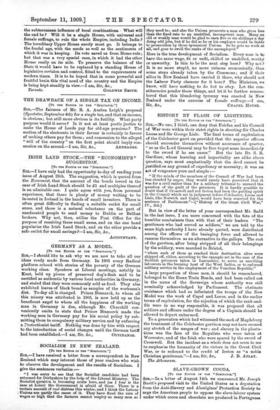HISTORY BY FLASH OF LIGHTNING. [To THE EDITOR OP THE
"SPECTATOR."] SIB,—NO one, I think, can deny that Fairfax and his Council of War' were within their strict rights in shooting Sir Charles Lucas and Sir George Lisle. The final terms of capitulation of the Colchester garrison provided that the superior officers should surrender themselves without assurance of, quarter, "so as the Lord General may be free "to put some immediately
to the sword if he see cause." But the late Dr. S. R. Gardiner, whose learning and impartiality are alike above question, says most emphatically that the deed cannot be justified on any ground of expediency or necessity; it was an act of vengeance pure and simple :— " If the minds of the members of the Council of War had been less clouded by anger, they would surely have perceived that it was for a civil rather than for a military tribunal to unravel the question of the guilt of the prisoners. It is hardly possible to doubt that if Cromwell and not Ireton had been the guiding spirit in the Council which sat in judgment before Colchester, Lucas and Lisle, like Norwich and Capel, would have been reserved for the sentence of Parliament."—(" History of the Great Civil War," IV., 205.) But in view of the letter of your correspondent Mr. Sadd in the last issue, I am more concerned with the fate of the humbler combatants than with that of their leaders. " The gentlemen who had served as soldiers," we are told by the same high authority I have already quoted, were distributed among the officers of the besieging force and allowed to ransom themselves as an alternative to the galleys. The rest of the garrison, after being stripped of all their belongings by the soldiery, were marched to Bristol, "where such of them as reached their destination alive were shipped off, either, according to the example set in the case of the Scottish prisoners taken in Lancashire, to , servo as un • • labourers in the burning heat of the West Indies, or to enfo military service in the employment of the Venetian Republic."
A large proportion of these men, it should be remembered, belonged to the Essex Train Bands, and had been called out in the name of the Sovereign whose authority was still nominally acknowledged by Parliament. The obstinate resistance which had so infuriated the troops of the New Model was the work of Capel and Lucas, and in the earlier terms of capitulation, for the rejection of which the rank-and- file were in no way responsible, it was proposed that all soldiers and officers under the" degree of a Captain should be allowed to depart unharmed.
To a generation which had witnessed the sack of Magdeburg the treatment of the Colchester garrison may not have seemed any stretch of the usages of war ; and slavery in the planta- tions was the fate of the Royalists who were taken at Worcester, and of the Irish who were spared by the sword of Cromwell. Bnt the incident as a whole does not seem to me to emphasise the humanity of the victors in the Great Civil War, or to redound to the credit of Ireton as "a noble
Christian gentleman."—I am, Sir, &e., J. B. ATLAY.
The Athenzum.






































 Previous page
Previous page